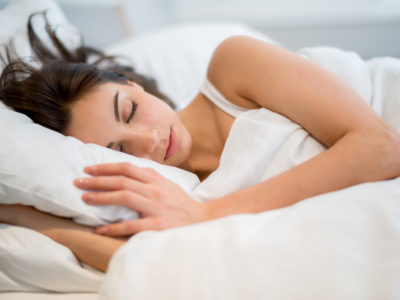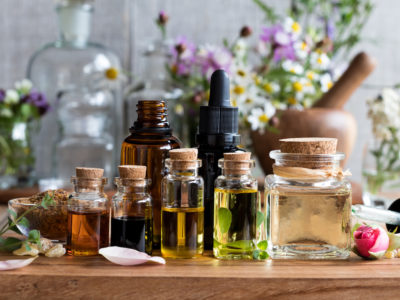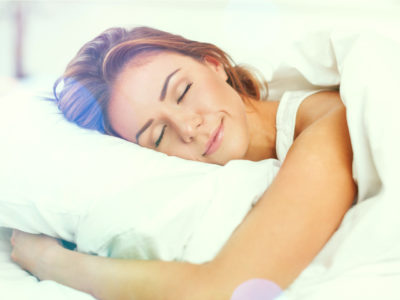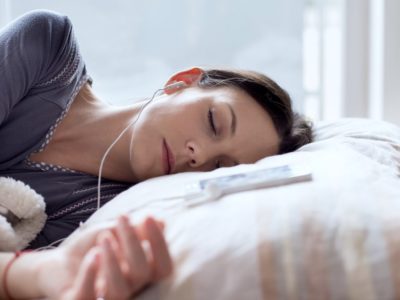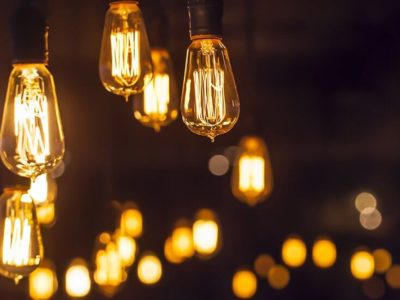Table of Contents[Hide][Show]
How to Get Rid of Insomnia…Fast+−
- Aromatherapy
- 14 Essential Oil Alternatives To Medicine
- Cognitive Behavioral Therapy (CBT)
- Diet
- Exercise
- Good Sleep Habits
- Herbal Remedies
- Light Therapy
- Melatonin
- Relaxation Techniques
- Gut Health
- 9 Sleep Tips Arianna Huffington Swears By
- Can Sleep Music Really Help You Sleep Better? (According To Science)
- Full Spectrum Lights: How Hacking Light Can Boost Your Mood
Tossing and turning in bed.
Flipping your pillow to the “cool” side.
Your mind repeatedly running through tomorrow’s to-do list.
Sleepless nights are no fun, and neither are the drowsy, irritable days that follow them.
Luckily, they can be avoidable—and we’re here to help!
Insomnia and poor sleep are often caused by lifestyle choices, which means they can be resolved with a few changes and new, healthy, sleep-promoting habits.
Read on for everything you need to know about your sleep issues and, most importantly, how to stop insomnia.
What Is Insomnia?
Insomnia is a sleep disorder that can manifest in several ways.
- Difficulty falling asleep
- Waking up throughout the night
- Waking up too early
Every person has different sleep needs, so it’s important to keep that in mind when you’re trying to determine whether or not you have insomnia. What may be waking up too early for you might be just the right amount of sleep for someone else.
In general, however, adults aged 18-60 need 7 hours of sleep each night to be functioning at their best and healthiest level.
Insomnia can affect your emotional, physical, and mental health, so look out for these other signs of insomnia, as well.
- Not feeling well-rested when you wake up
- Feeling tired or sleepy during the day
- Feeling concerned or worried about your sleep
- Anxiety
- Depression
- Irritability
- Cognitive issues such as difficulty concentrating or poor memory
Types of Insomnia
At some point in your life, it’s likely that you’ll experience short-term insomnia, also known as acute insomnia. It can last from several days to a few weeks.
If your insomnia persists for longer than a month, it’s considered to be long-term, often called chronic, insomnia.
Of course, most people have experienced restless nights here and there. So how do you know when your lack of sleep crosses into insomnia territory? Let’s go over some of the causes of insomnia.
Related
5 Tummy-Turning Reasons to Get Serious About Sleep
It’s considered the hallmark of adulthood: “I’m so tired.” Nap culture, staying-in-on-a-Friday culture, bragging-about-how-little-sleep-you-got culture is rampant in 2019. But have you ever thought about how your REM cycle affects your gut culture? Science is beginning to wake up to the relationship between your gut microbiome and the quality and quantity of sleep you’re getting. …
Causes of Insomnia
Insomnia can be traced to many root causes, including lifestyle choices, illness, or stress. In some cases, treating the cause of insomnia is the fastest and most effective way to get rid of it.
So, before we share some of the top ways to cure insomnia, let’s take a look at some of the most common causes of insomnia.
Eating Too Late
Eating late at night can cause physical reactions that’ll keep you awake, such as heartburn or acid reflux. Depending on what and how much you eat, you could also feel bloated or otherwise uncomfortable, making it more difficult for you to fall asleep.
On the other hand, if you go to bed hungry, your empty stomach could keep you up! In that case, a light, healthy snack would be a good option.
Mental Health Disorders
Anxiety, post-traumatic stress disorder (PTSD), bipolar disorder, and other mental health conditions could all make it difficult for you to fall asleep and stay asleep.
And, depression can lead to early morning wake-ups.
Medications
If you’re taking any medications, either prescription or over-the-counter, they could interfere with your sleep. Be sure you are fully aware of the side effects before beginning any medication, even if it’s an herbal or holistic supplement.
In addition, many medications, including some cold medicines, contain caffeine or other stimulants. Talk to your doctor or pharmacist about the availability of a “nighttime” version, instead.
Physical Conditions
Certain medical or physical conditions can also lead to insomnia.
Sleep apnea and restless leg syndrome are two well-known sleep disorders. But other illnesses such as chronic pain, Parkinson’s disease, and an overactive thyroid can also bring on insomnia.
Stimulants
Caffeine, alcohol, and nicotine can all disrupt your sleep and lead to insomnia.
Sodas and some teas contain caffeine, which will make it difficult to fall asleep, especially if you drink them in the evening or late at night. Nicotine is also a stimulant; it will likewise have a negative affect on your sleep.
And a glass of wine before bed might seem like a quick way to fall asleep. However, alcohol can make it difficult to achieve the deeper sleep stages, meaning you’ll be waking up more easily during the night.
Related
12 Caffeine Alternatives for a Natural Energy Boost
Increase your energy levels throughout the day with these caffeine alternatives. As an added bonus to drinking less caffeine, these substitutes have plenty of added health benefits that might make you think twice next time you reach for another cup of Joe!
Stress
When you’re stressed (about work, relationships, school, or anything else), your brain can have a difficult time “shutting off” at night. Your racing thoughts can keep you up late at night and make it difficult for you to get a good night’s sleep.
Stressful life events, such as the loss of a loved one, divorce, moving, etc. can also lead to insomnia.
Your Schedule
Your sleep schedule is guided by your circadian rhythm.
This 24-hour internal clock picks up on environmental cues such as light versus dark, when you last ate, etc. then sends signals to your body of when it should be awake or asleep.
Jet lag, working extremely early/late shifts, and an inconsistent sleep schedule can all disrupt your circadian rhythm and result in insomnia.
How to Get Rid of Insomnia…Fast
Depending on what’s causing your insomnia, sometimes there are lifestyle changes that can help you get back to sleep. For example, if you’re eating too late, you can try food-prepping over the weekend to make weeknight dinners simpler and quicker so you can eat earlier.
However, if those changes aren’t helping, or if your insomnia continues, here are some tips for getting back into a healthier sleep pattern.
Aromatherapy
Studies show that scents can affect your sleep in a positive way.
Certain scents can help you relax, promoting a good night’s sleep. These scents include:
- Bergamot
- Cedarwood
- Chamomile
- Clary Sage
- Lavender
You can use these in an essential oil diffuser, add a few drops to a warm evening bath, or even use them in a mister or an under-the-pillow sachet.
Depending on the oil and its intended usage, you can even put a few drops on the inside of your wrist or incorporate it in a soothing massage treatment.
Related
14 Essential Oil Alternatives To Medicine
When you’re not feeling well or just need a health boost, have you considered giving essential oils a try? Learn more about the best essential oils substitutes for medicine and how your body can benefit from them!
Cognitive Behavioral Therapy (CBT)
Cognitive Behavioral Therapy (CBT) is a highly effective psychological treatment for a number of issues, including anxiety, depression, alcohol and drug addictions, and insomnia.
Working with your therapist, you’ll learn to recognize and change thinking patterns that are keeping you from being your healthiest self. Studies show that CBT can greatly reduce insomnia occurrences for up to a year after treatment.
In the case of insomnia, CBT can teach you how to control your mood, calm your mind, slow your breathing, and sleep well.
Diet
You know that post-meal, contentedly drowsy feeling you get? It’s because some foods naturally produce a sleepy effect.
One of these is tryptophan, an amino acid your body uses to produce the sleep-supporting hormones serotonin and melatonin.
Tryptophan can be found in:
- Diary products
- Egg whites
- Fish
- Peanuts
- Pumpkin, sesame, and sunflower seeds
- Turkey
Another important nutrient for sleep is magnesium, a natural sedative.
Food high in magnesium include:
- Almonds
- Cashews
- Dark, leafy green vegetables
- Legumes and seeds
- Whole grains
Exercise
Studies show that exercise can be an effective insomnia remedy, reducing insomnia incidents and promoting deeper sleep.
To improve your sleep, you’ll want to engage in moderate exercise for at least 20 minutes per day.
For even better results, you can combine working out with light therapy by taking your exercise outdoors, giving you a double benefit!
Good Sleep Habits
If you want to sleep well at night, it’s important to cultivate good sleep habits.
Some of these include:
- Turning off electronics (and their stimulating blue lights) at least an hour before bed.
- Maintaining a consistent sleep schedule whenever possible, even on weekends.
- Avoiding stimulating activities in the evening. Instead, journal, read, meditate, or go for a leisurely walk, instead.
- Creating a sleep sanctuary in your bedroom, with comfortable bedding, dim lights, black out curtains, a white noise machine, and whatever else feels good for you.
- Removing electronics, including computers and televisions, from the bedroom so your mind considers it a place of rest, not mental stimulation.
Herbal Remedies
Why have herbal remedies been passed down from generation to generation? Because they work!
Some of the most effective home remedies for insomnia include herbal teas and infusions, including:
- Chamomile
- Lemon Balm
- Valerian
- Vitex Agnus Castus
Light Therapy
Remember the circadian rhythm we talked about earlier? It regulates sleep hormones and lets your body know when it’s time to wake up versus time to sleep.
Natural, outdoor light is one of the most effective ways to reset your circadian rhythms when your sleep cycle is thrown off, especially if it’s due to changing work shifts or travel between different time zones.
Here, timing is important. If you’re having trouble falling asleep at night, try going for a walk first thing in the morning. This lets your body know that sleep is over and it should be awake by now. On the other hand, if you’re having trouble staying up in the evening, try going for a walk in the late afternoon/early evening (before dark). This will let your body know that it’s still time to be awake.
If you can’t get outside while it’s light out, you can try a lightbox for in-home light therapy.
Melatonin
Although we mentioned supplements earlier, melatonin is so effective that it deserves its own mention.
Melatonin is a hormone that your body creates when it gets dark out. It triggers your circadian rhythm and signals to your body that it’s time for sleep.
If your melatonin production is low or interrupted (due to factors such as age or jet lag), your body isn’t receiving those “time for sleep” cues.
In this case, melatonin supplements in the evening can help you fall asleep and sleep through the night.
Relaxation Techniques
Stress is one of the biggest causes of insomnia. So, anything you do to cut back stress will also have a positive impact on your sleep.
Ideally, you’d be able to avoid stressful situations altogether. However, we all know that’s not always possible.
When you can’t escape your stressors, meditating for even just a few minutes can lower your stress hormones and help you feel more relaxed by bedtime.
Other relaxation techniques you can try include:
- Body Scans
- Journaling
- Mindfulness
- Positive Self-Talk
- Visualization
- Yoga and/or Tai Chi
Gut Health
Believe it or not, the quality of your sleep can also be affected by your gut!
One recent study showed that having a more diverse gut bacteria was linked to better, longer sleep.
Another study shows that one specific “good” bacteria, bifidobacterium, was related to greater amounts of sleep time and reduced wakefulness throughout the night.
With such a clear connection between gut health and insomnia, we recommend our favorite probiotic supplement by Just Thrive. Its spore-based bacteria have a 100% survivability rate and are clinically proven to “arrive alive” in your gut, encouraging a gut microbiome teeming with beneficial bacteria. Users have also reported more energy and better sleep, among other positive effects.
Not only your insomnia, but your overall health, will benefit from having a healthy gut!
Final Thoughts
Restless nights are no fun!
Luckily, insomnia is something you can treat, often with some consistent effort and a few tweaks to your current lifestyle.
Even better, some of the best cures are the ones you can do at home, for free.
Try incorporating some of our suggestions above into your current lifestyle. A good night’s sleep and a fresh, energetic morning await!
You May Also Like…

